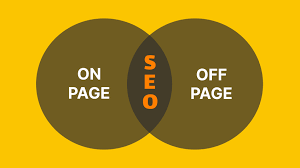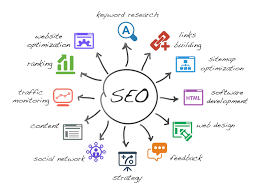SEO: On-Page and Off-Page Strategies
Search Engine Optimization (SEO) is crucial for improving your website’s visibility and ranking on search engine results pages. There are two main components of SEO: on-page and off-page optimization.
On-Page SEO
On-page SEO refers to optimizing individual web pages to rank higher and earn more relevant traffic in search engines. This includes optimizing content, meta tags, headings, images, and internal links. Key on-page optimization factors include:
- Keyword research and optimization
- High-quality, relevant content creation
- Title tags and meta descriptions optimization
- URL structure optimization
- Internal linking for better navigation
- Image optimization with alt text
- User-friendly website design and mobile responsiveness
Off-Page SEO
Off-page SEO focuses on improving the website’s authority, relevance, and popularity through external factors. This involves activities outside of the website itself to enhance its credibility and trustworthiness in the eyes of search engines. Key off-page optimization strategies include:
- Link building from reputable websites
- Social media marketing and engagement
- Guest blogging on relevant sites
- Influencer collaborations and partnerships
- Online reputation management through reviews and ratings
Both on-page and off-page SEO are essential for a comprehensive search engine optimization strategy. By combining these strategies effectively, you can improve your website’s visibility, drive organic traffic, and ultimately achieve higher rankings in search engine results.
7 Essential On-Page and Off-Page SEO Tips to Boost Your Website’s Performance
- Create high-quality, relevant content for your website.
- Optimize your meta tags, including title tags and meta descriptions.
- Use descriptive URLs with targeted keywords.
- Optimize images by using descriptive filenames and alt text.
- Improve website speed and user experience for better SEO performance.
- Regularly update and maintain your website content.
- Build quality backlinks from reputable websites in your industry.
Create high-quality, relevant content for your website.
Creating high-quality and relevant content for your website is a fundamental tip for effective SEO, both on-page and off-page. By developing valuable and engaging content that resonates with your target audience, you can attract more visitors, increase user engagement, and establish your website as a credible source of information. Search engines prioritize websites that offer quality content to users, so investing time and effort into crafting compelling articles, blog posts, videos, or infographics can significantly boost your SEO efforts and contribute to better search engine rankings.
Optimize your meta tags, including title tags and meta descriptions.
Optimizing your meta tags, such as title tags and meta descriptions, is a crucial aspect of both on-page and off-page SEO strategies. Title tags provide a concise and relevant description of your webpage’s content, helping search engines understand the context of your page. Meta descriptions, on the other hand, offer a brief summary that entices users to click through to your website from search engine results pages. By carefully crafting compelling and keyword-rich meta tags, you can improve your website’s visibility, increase click-through rates, and enhance overall search engine rankings.
Use descriptive URLs with targeted keywords.
When implementing SEO strategies for both on-page and off-page optimization, it is crucial to use descriptive URLs with targeted keywords. By incorporating relevant keywords in your website’s URLs, you can improve search engine visibility and help both users and search engines understand the content of your web pages. Descriptive URLs not only enhance the user experience by providing clear navigation but also signal to search engines the relevance of your content, ultimately contributing to higher rankings in search results. Incorporating targeted keywords in your URLs is a simple yet effective way to optimize your website for better SEO performance.
Optimize images by using descriptive filenames and alt text.
Optimizing images is a crucial aspect of both on-page and off-page SEO strategies. By using descriptive filenames and alt text for images, you can improve your website’s accessibility and search engine visibility. Descriptive filenames help search engines understand the content of the image, while alt text provides a text alternative that is displayed if the image fails to load. This practice not only enhances user experience but also signals to search engines the relevance of your content, ultimately boosting your website’s SEO performance.
Improve website speed and user experience for better SEO performance.
Optimizing website speed and enhancing user experience are critical components of a successful SEO strategy. A fast-loading website not only improves search engine rankings but also ensures a positive user experience, leading to higher engagement and lower bounce rates. By focusing on improving website speed and user experience, businesses can attract more organic traffic, retain visitors for longer periods, and ultimately boost their overall SEO performance.
Regularly update and maintain your website content.
Regularly updating and maintaining your website content is a crucial tip for effective SEO, both on-page and off-page. Fresh and relevant content not only keeps your audience engaged but also signals to search engines that your site is active and authoritative. By consistently adding new information, blog posts, or product updates, you can improve your site’s visibility and ranking in search results. Additionally, updating content allows you to incorporate new keywords and optimize existing pages for better SEO performance. Remember, keeping your website content up-to-date is key to attracting organic traffic and staying competitive in the online landscape.
Build quality backlinks from reputable websites in your industry.
Building quality backlinks from reputable websites in your industry is a crucial strategy for enhancing your website’s authority and improving its search engine rankings. By securing backlinks from trustworthy and relevant sources, you not only increase your website’s credibility but also signal to search engines that your content is valuable and worthy of being ranked higher. These quality backlinks act as a vote of confidence for your website, helping to boost organic traffic and establish your online presence as a reliable source of information within your industry.



